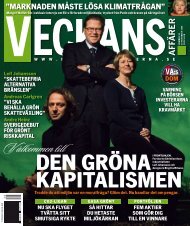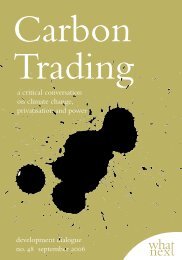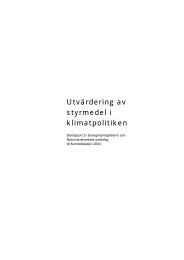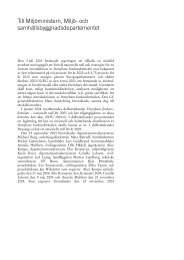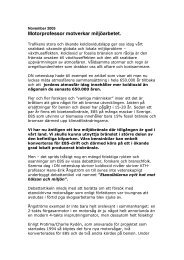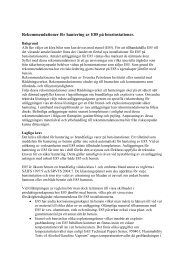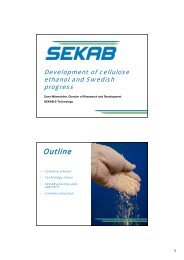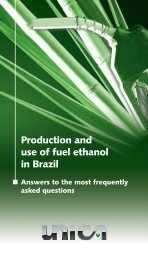Sugarcane ethanol: Contributions to climate change - BAFF
Sugarcane ethanol: Contributions to climate change - BAFF
Sugarcane ethanol: Contributions to climate change - BAFF
Create successful ePaper yourself
Turn your PDF publications into a flip-book with our unique Google optimized e-Paper software.
Environmental sustainability of sugarcane <strong>ethanol</strong> in Brazil<br />
2. The Brazilian environmental legal framework regulating <strong>ethanol</strong> production<br />
�e Brazilian environmental legal framework is complex and one of the most stringent<br />
and advanced in the World. As an agribusiness activity, the <strong>ethanol</strong>/sugar industry has<br />
several environmental restrictions that require appropriate legislation or general policies<br />
for its operation. Some of them are pioneers in the area which de�ne principles in order <strong>to</strong><br />
maintain the welfare of living beings and <strong>to</strong> provide resources for future generations: the<br />
�rst version of the Brazilian forest code dated from 1931, already addressed the need <strong>to</strong><br />
combine forest cover with quality of life and livelihoods.<br />
Brazil has wide range of federal and state laws regarding environmental protection (Table 3),<br />
aiming at combining the social economic development with environmental preservation,<br />
which the <strong>ethanol</strong> business need <strong>to</strong> comply with for its proper operation.<br />
They also involve frameworks such as the Environmental Impact Assessment and<br />
Environmental Licensing, among others (Figure 3), especially for the implementation of<br />
new project: i.e. new green �eld projects in Brazil are being stringently assessed (Nassar et<br />
al., this book) using these frameworks.<br />
Volunteer adherence <strong>to</strong> Environmental Pro<strong>to</strong>cols represents also a major breakthrough for<br />
the sugar business. For example �e ‘Pro<strong>to</strong>colo Agroambiental do Se<strong>to</strong>r Sucroalcooleiro’<br />
(Agriculture and Environmental Pro<strong>to</strong>col for the <strong>ethanol</strong>/sugar industry) signed by UNICA<br />
and the Government of the State of São Paulo in June 2007 deals with issues such as:<br />
conservation of soil and water resources, protection of forests, recovery of riparian corridors<br />
and watersheds, reduction of greenhouse emissions and improve the use of agrochemicals<br />
and fertilizers. But its main focus is anticipating the legal deadlines for ending sugarcane<br />
burning by 2014 from previous deadline of 2021. In February 2008, the State Secretariat<br />
of Environment reported that 141 industries of sugar and alcohol had already signed the<br />
Pro<strong>to</strong>col, receiving the ‘Certi�cado de Conformidade Agroambiental’ (Agricultural and<br />
Environmental Certi�cate of Compliance). �ese adherences correspond for more than<br />
90% of the <strong>to</strong>tal sugarcane production in São Paulo. A similar initiative is happening in the<br />
State of Minas Gerais with the ‘Pro<strong>to</strong>colo de Intenções de Eliminação da Queima da Cana<br />
no Se<strong>to</strong>r Sucroalcooleiro de Minas Gerais’ from August 2008.<br />
<strong>Sugarcane</strong> <strong>ethanol</strong> 117



